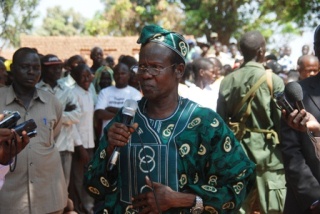G. Equatoria politicians discuss federalism as Igga lashes out at rebel leader Machar
May 25, 2014 (ADDIS ABABA) – South Sudanese politicians and intellectuals from the three states of the Greater Equatoria region held a meeting in the capital, Juba, on Saturday during which they discussed the federal system of governance.

The idea to embrace federalism, which is being pushed by the rebel faction of the SPLM led by the former vice-president Riek Machar was, however, opposed by his successor, James Wani Igga who cautioned Equatorians against buying the concept.
The framers of South Sudan’s 2011 transitional constitution avoided mention of federalism, opting instead for a nominally ‘decentralized system’.
Observers, however, say most of the Equatorian politicians and intellectuals seem to be in favour of federalism given their resolution in this regard at last year’s conference.
Central Equatoria state governor, Clement Wani Kongo, though not part of the rebels, was last month the first to publicly declare his position in favor of federalism, saying, “the people of Equatoria have come openly that this [federalism] is what should be included in the constitution.”
Many leaders from the greater Upper Nile region have as well in the past expressed their support towards federalism unlike their counter-parts in greater Bahr el Ghazal region who have reservations on federal system of governance seeing it as a “disadvantage” to their region given its meagre resources.
The rebels under Machar’s leadership have demanded restructuring of the state on the basis of a new peace agreement and a federal constitution in order to end the current five-month old crisis in the new country.
VP IGGA LABELS MACHAR A LIAR
Igga, the highest-ranking Equatorian in the country’s politics, urged Equatorians to neither join rebel leader Machar nor buy his idea of a federal system of governance.
“Many Equatorians saw that this idea of Riek on federation will rescue them. Equatorians, no, Riek is a liar. So please the few of us who think they must join Riek in order to get federation, please you are on the wrong road”, Igga told the conference.
He accused the country’s ex-vice president of allegedly stealing from the Equatorians the idea of federalism, which was proposed at a similar conference in Juba last year.
“This federation here is not the creation of Riek, we all know that Riek actually stole this renewed call for federalism in this hall here – Nyakuron – during a Equatorian consultative conference like this, because he knew the resolutions of it then he said yes, I am also for federation,” he further added.
Soon after Igga’s remarks, however, a high-ranking state government official warned journalists present at the conference not to report on the speech of the vice president, saying it ‘did not constitute part of the conference”.
REBELS WELCOME DEBATE ON FEDERALISM
Meanwhile, officials of the armed opposition faction of the country’s ruling party have welcomed discussions on federalism, describing it as a “courageous step” towards chartering the future governance of the country.
“Our leadership welcomes this courageous step taken by the Equatorian leaders and intellectuals in discussing the importance of constituting and implementing a federal system of governance in South Sudan,” Machar’s spokesperson James Gatdet Dak said when reached by Sudan Tribune on Sunday.
He further pointed that it was not significant to fight over who initiated the idea, but rather focus on how to implement the federalism idea.
“The question would be who is ready to champion this overdue popular demand of the people and implement it? I think it is important to say that those leaders who embrace the idea of federalism should instead lead their people towards achieving it despite who initiated the idea,” he further emphasised.
In an interview with Sudan Tribune last week, an Equatorian member of SPLM/A-in-Opposition, Oyet Nathaniel Pierino, observed that a federal system of governance could address issues of diversity and accelerate development in South Sudan.
Critics of the federalism idea, however, argue that federalism is a path toward fragmentation of the country into tribal regions. Some pointed to the recent series of Equatorian regional conferences as a resurgence of kokora – a term used in reference to Equatorian particularism.
But Oyet, formerly head of the political science department at Juba University, says South Sudan’s current crisis was mainly as a result of lack of separation of powers, checks and balances and development of independent legal and judicial branches.
(ST)
